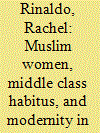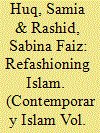|
|
|
Sort Order |
|
|
|
Items / Page
|
|
|
|
|
|
|
| Srl | Item |
| 1 |
ID:
081751


|
|
|
|
|
| Publication |
2008.
|
| Summary/Abstract |
This paper examines the relationship between an individual's degree of religiosity (or piety) and his/her participation in everyday life in a secular, cosmopolitan and multicultural society such as Singapore, by focusing on the practice of public dining. Given that Islam has dietary restrictions ('halal'), this paper hypothesizes that a devout Muslim might be placed in a situation of considerable unease when dining publicly, as the external environment may conflict with these restrictions. The research for this paper involved interviews with 20 Singaporean Muslims, who have described themselves as being 'devout' and 'practicing', asking about their views on dining at public food courts or hawker centers. It finds that rather than choosing to avoid these situations, they engaged in a series of defensive strategies to accommodate their religious obligations as well as intercultural interactions, to a certain degree. This paper concludes that because deeply religious Muslims in Singapore implement 'defensive dining,' concerns about self-exclusion, isolationism and separatism are probably unfounded, as these individuals appear willing to participate in multicultural and cosmopolitan everyday l
|
|
|
|
|
|
|
|
|
|
|
|
|
|
|
|
| 2 |
ID:
081750


|
|
|
|
|
| Publication |
2008.
|
| Summary/Abstract |
This article asks how pious religious practices, which are often highly gendered, and implicated in diverse formulations of "the modern" in non-Western contexts. Based on ethnographic research among women members of Indonesia's Prosperous Justice Party (PKS), I argue that PKS women's pious practices are part of the creation of a particular kind of middle class subjectivity. An examination of two constitutive elements of this habitus, clothing and marriage, reveals how these pious Islamic practices enact class and gender difference, and simultaneously produce "modern" selves. While scholars have shown that gender is an important axis for class difference, I extend this argument to suggest that gendered forms of piety are key ways class in which distinctions are embodied and expressed. Yet the habitus of PKS women is just one of several competing Islamic habitus in Indonesia. The question of which habitus is most culturally legitimate, I maintain, turns on the hegemony of particular understandings of piety and ideas about how modernity should be defined-issues which remain unresolved in contemporary Indonesia.
|
|
|
|
|
|
|
|
|
|
|
|
|
|
|
|
| 3 |
ID:
081749


|
|
|
|
|
| Publication |
2008.
|
| Summary/Abstract |
This paper attempts to explore the development of Islamic identity of a group of elite women in Dhaka, Bangladesh. These women constitute a significant group in the country where 10% of the rich control 40% of the national wealth, and the 10% of the poorest control 1.84% of the national wealth.* Socially, politically and economically, elite women and their families are powerful and have access to resources and political influence. Many of these women who did not grow up with a very strict religious orientation came to Islam and consolidated religious thoughts and practices through a weekly Quran reading class. This particular Quran class began in 2002. The classes were initiated by a foreign diplomat's wife who was Muslim, and have continued even after her departure from the country in 2004. While Dhaka houses many meetings of Muslim men and women to discuss Islamic ideas and practices, this particular class was quite unique in its ability to attract and convert elite women whose lives were seemingly perfect. This urban elite phenomenon of Islamic revivalism has not been the subject of any in-depth research in Bangladesh, and this work therefore, is the first of its kind and largely introductory
|
|
|
|
|
|
|
|
|
|
|
|
|
|
|
|
|
|
|
|
|